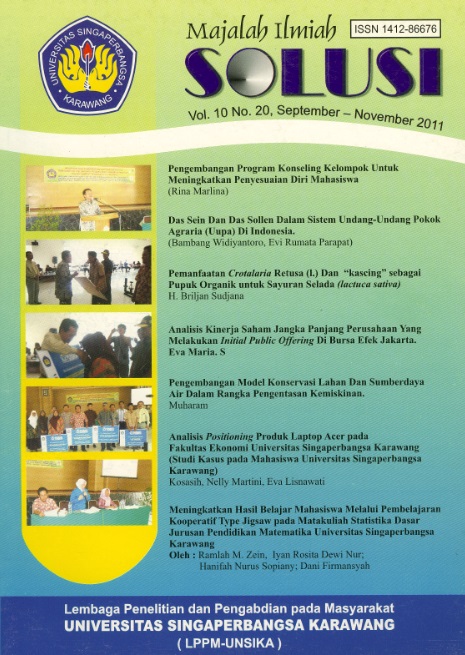“ EFEK PENGGUNAAN STRATEGI PEMBELAJARAN KUANTUM PADA MATA KULIAH SPEAKING MAHASISWA PRODI PENDIDIKAN BAHASA INGGRIS FKIP UNSIKAâ€
DOI:
https://doi.org/10.35706/solusi.v10i21.85Abstract
Teachers often face the problem of having lack creativity regarding the innovative teaching strategy and method in speaking. Therefore the research was aimed to know the effect of Quantum Teaching Strategy ( QTS) on the student’s performance of English Speaking Skill in comparison to Conventional Teaching Strategy ( CTS) to have the clear portrait of the QTS’ advantage. The quantitative research was to measure the pertaining effects of QTS on the Speaking performance. The data was taken from an experimental research, involving 30 students in UNSIKA (Singaperbangsa Karawang University) in the English Education program. The 2nd semester students were randomly selected. 29 students run learning activity with quantum learning method and 26 students studied in control group. The experimental group got particular treatments related to quantum learning method. The treatment for the experimental group was to improve their speaking skill. The control group was taught in conventional teaching strategy. Both groups pretest and post test to identify their performance on the speaking skill improvement. The measurement for both groups was conducted at the same test. In term of quantitative approach, quasi experiment design was used to describe the different result of experimental group and control group. T-test was used to analyze the data to measure the effect of quantum teaching strategy in comparison to Conventional Teaching Strategy ( CTS). By means of The T Test, the finding showed that QTS affected the performance of English Speaking skill. It is recommended for English Teacher to use QTS as alternative to improve quality of teaching.Downloads
References
Brown, H. D. 2001. Teaching by Principles. An Interactive Approach to Language Pedagogy. Englewood Cliffs: Prentice Hall.
Carnell, E. ( 2005). Understanding and enriching young people learning: issues, complexities and challenges. Improving School.
DePorter. 2002. Quantum Learning. ( translated by Ary Nilandari). Bandung. Kaifa
DePorter, B. Reardon, & Nourie. 1999. Quantum Teaching: Orchestrating Student Success. Boston: Allyin and Bacon
Frankel and Wallen. 1996. How To Design And Evaluate Research in Education. New York: McGraw-Hill.inc
Freeman.J. ( 1985). The psychology of gifted children: perspective on development and education. Manchester: john Wiley Sons. Ltd.
Hatch Evelyn and Anna Lazarton.1991. The Research Manual: Design and Statistics for applied Linguistics. Massachussets: Heinle& Heinle Publisher
Harmer, Jeremy. 2002. The Practical English as a Foreign Language Teaching. Malaysia: Pearson Education Limited.
Harmer, Jeremy. 2007. How to Teach English. China: Pearson Education Limited. Hughes ,Arthur. 1989. Testing For language Teachers. Melbourne: Cambridge University Press.
Syam, Nelly. 2009. Exploring Student’s problems and expectations in Speaking Class ( A Case Study at MAN in Riau ). Bandung : Indonesia University of Education. Thornbury, Scott. 2005. How to Teach Speaking. Malaysia ; Longman.
www.HarianEkonomiNeraca.com

